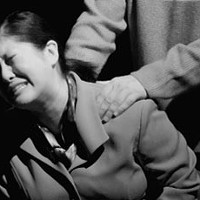My first live sampling of Anna Deavere Smith in action was at the landmark National Performing Arts Convention in 2008, which I attended as a member of the Music Critics Association of North America. After the mayor of Denver, John Hickenlooper, welcomed all convention participants from across the nation to his city, Smith took the stage to fire up all the performing artists present in an overflowing auditorium - mincing no words in letting us know how unwelcome critics of all stripes were to her.
It wasn't exactly a faithful echo of Rodney King's most famous plea, "Why can't we all just get along?" Yet this was the same playwright who took up King's cause in Twilight: Los Angeles, 1992 - earning a Tony Award nomination in 1994. Driven by the explosive repercussions from the farcical trial of the policemen who brutalized King, Smith had devoted herself to searching out the truth, as told by people closely involved in the beating and in the contrasting trials that followed for the acquitted brutes who assaulted King and, not long later, the convicted rioters who bludgeoned Reginald Denny.
So what had changed since Smith had stitched together the meatiest portions of interviews she herself taped with relatives, defendants, activists, community leaders, and a colorful sampling of famed and relatively anonymous Angelenos? Not much, as witnessed by the vividly imagined, meticulously produced On Q production, currently at Duke Energy Theater through December 8.
Smith doesn't cut anybody any slack. Not the cops, not the jurors, and certainly not the sententious celebs. The tape doesn't lie when the microphone is picking up on Jessye Norman, Cornel West, and Senator Bill Bradley.
The playwright impersonated them all in the original Broadway staging, along with more than 40 other characters in a one-woman tour de force. Directing the On Q version, Corlis Hayes and Eric Paulk demonstrate that there's nearly enough juice here for ten actors, five men and five women. They preserve a little of the gender-bending flavor of Smith's performance as Zendyn Duellman portrays writer Joe Viola and newspaper editor Shelby Coffee. Karina Roberts-Caporino is even more memorable as LAPD defendant Ted Briseno, Frederico Octavio, and a lovably goofy Denny. She's even butchy within her own sex as Black Panther leader Elaine Brown.
Confined to their own gender, the other women have plenty to sink their teeth into. After feasting on the weary noblesse oblige of Jessye Norman, Lillie Ann Oden delivers a second gem as Maria, Juror #7, who doggedly fights for justice behind closed doors at King's civil rights trial. Discarding more artifice each time I see her onstage, Amy Wada seethes with frustration as Josie Morales, a witness to the beating who is never called to testify, and she's strangely inspiring as Elvira Evers, a pregnant victim of the rioting who survives due to a wondrous fluke. Stacy Rose is memorable as Angela King, Rodney's aunt, and truly poignant as Young-Sun Han, a Korean shopkeeper victimized by the looting rampage.
Of course, when the portrayals are taken out of the playwright's hands, directors and actors enter forcefully into the equation, with the Rorschach reactions of the viewer further clouding Smith's intentions. Seen through those lenses, I'd say Smith's sympathies went out most consistently to the victims of the riots - Denny, the passive Koreans, and the pregnant Panamanian - devil take the ghetto dwellers and their just grievances.
Some of the On Q departures from Smith's script are more willful and purposeful. Here we find helpful AV layered on, courtesy of Paulk's video concept, including news bulletins, snips from symposia hosted by Phil Donohue, and clips of Smith herself. The grungy, graffiti-smeared set by Dee Blackburn is flanked overhead by two large video screens, also invaluable in identifying the cavalcade of speakers.
Perhaps Hayes and Paulk chiefly feared that, set adrift from its original one-woman format, Twilight LA might devolve into a wearisome set of audition monologues. They succeed admirably overall with their sensory onslaught, most effectively when they stage the climactic remarks of Act 2 as an informal cocktail party, complete with bar and dinner table. But in an evening that's clocking in at two hours and 20 minutes plus intermission, the dance tableaus ably choreographed by Melissa McDaniel come across as an unnecessary burden.
One less guy would have resulted in the best-sized portions for all, but nearly all establish excellence. Norman Burt is a fearsome presence as security guard Keith Watson and absolutely chilling as Paul Parker, a lawyer and community organizer who has clearly lost his moral compass. On a couple of his portraits, James Lee Walker II takes it deliciously over-the-top, but he reins it in for the climactic portrait of the night, Twilight Bey, architect of the gang truce after the rioting. Both approaches work in Walker's nuanced sketching of Cornel West, by turns devastating and empathetic. In the shockingly dispassionate LAPD police chief Daryl Gates and then in painter Rudy Salas, who hates the cops in spite of his basic goodness, John W. Price hits the mark beautifully.
And underscoring his newfound ear for accents, Price touches our hearts with a recumbent rendition of Korean shopkeeper Walter Park, permanently disabled in the senseless crossfire.
The others in the cast are shortchanged in what they get to do. Of those two, I'd most like to see more of Richard Meier. You'll see him first as an anonymous juror who acquitted the four King defendants, equally shell-shocked by the outrage of the black underclass and the accolades from the KKK. Then he's Bill Bradley, so loftily senatorial that he seems only faintly familiar with the emotions of mere earthlings.
After such hieratic pontification, you may wonder: Where's the outrage? It's there aplenty, burnt into Smith's bipartisan takedown of American injustice, prejudice, irresponsibility, disconnected leadership, and self-destruction.

